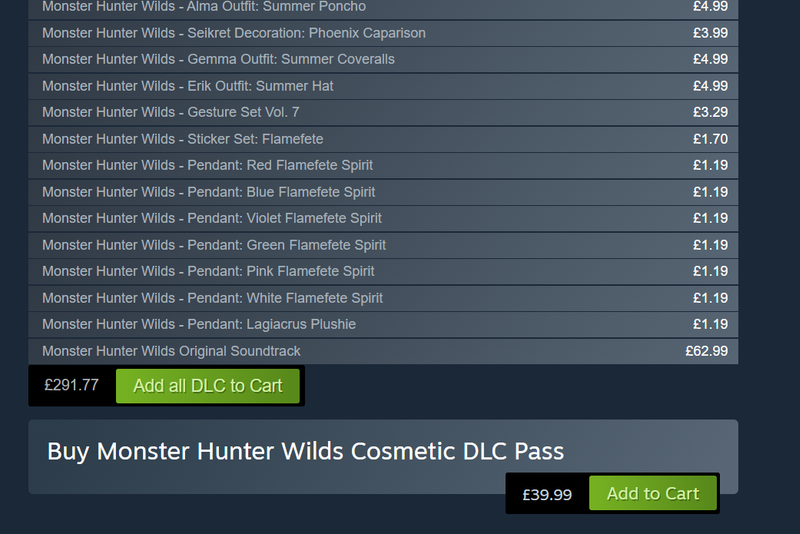Money Hunter: Capcom's Wild Monetisation

What's that? You're telling me this is a premium game that's only 6 months old?
So, from their recent FQ, Capcom admitted that Monster Hunter Wilds sales "fell below their initial expectations." When I saw that headline, I knew exactly what it was about, and it wasn’t the initial game sales. You don't get to complain after selling 10 million copies in the first month, even if the numbers drop off a cliff afterwards. For any normal company, that’s a massive win.
But for a modern AAA "Games as a Service" title, the box price is just the entry fee. The real money is in the microtransactions, and that's where their plan is clearly failing.
In a post I wrote back in early July, I pointed out how crucial MTX sales are to Capcom's strategy. At the time, they already had an insane £196.50 worth of cosmetic DLC for a game that had only been out for a few months. It was already excessive.
https://i.postimg.cc/ryt6p3h9/Screenshot-2025-07-05-031951.png
Imagine my surprise when I checked the store again today. The total cost to buy everything has jumped to £291.77. That's nearly a £100 increase in less than two months.
The most absurd part of this is the newly added digital Original Soundtrack, which they have the nerve to charge £63 for. Sixty-three quid for a digital music collection! For context, the massive OST for Final Fantasy VII Rebirth, which has even more tracks, costs less than that. You can't tell me they aren't desperately trying to squeeze every last penny from the player base. This is a full-price premium product that's looking like a F2P gacha trying to maximise profits before closing down.
Capcom mentioned they would adjust the game's price to lower the barrier to entry, but as I've talked about before, that measly 20% discount isn't fooling anyone. It feels like they've already given up on attracting new players and are instead focused on milking the few who are still around.
As a small anecdote, I have two hardcore Monster Hunter friends on Steam in Japan. These are guys who bought a ton of DLC for World and Rise. One of them hasn't touched Wilds since the first title update. The other still logs on for new content, but both have not bought any of the new cosmetics since their launch honeymoon period. If even the die-hard fans are refusing to spend, you know your MTX strategy isn't working.
The Steam Top Sellers ranking doesn't lie either, after the honeymoon phase, the only time the game even broke through top 50 is when they had the summer sale and the current sale, despite that huge list of MTX.
✅ The Verdict
When you actually line up the numbers, it’s grim.
Monster Hunter: World + Iceborne took five years for its paid DLC to climb to around the £450-500 mark. Then Rise + Sunbreak came along and hit £550-600 in just three years, and a lot of us thought that was getting out of hand.
But Wilds is on another level entirely. Hitting almost £300 in a few short months is just insane. At this rate, it's going to blow past the entire DLC lifespan of both previous games in less than a year.
No matter which way you look at it, this paints a disgusting picture of Capcom's greed. There are only two possibilities here. Either this was the plan all along, born from an arrogant confidence that Wilds would be a massive hit with a player base ready to be milked for every penny. Or this is all a panicked reaction because they promised investors a gravy train and now the MTX revenue just ain't there. Whether it was arrogance from the get-go or a panicked cash grab now, the result is the same. It shows a company more focused on its bottom line than its players.